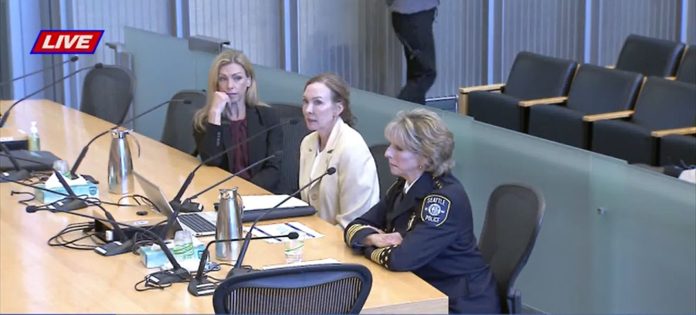
The Seattle Police Department (SPD) has been having a rough year, prompting a leadership change. SPD Chief Adrian Diaz was ousted from his position in May in the wake of an onslaught of lawsuits and scandals.
Detective Denise “Cookie” Bouldin filed a lawsuit in November alleging she faced racism and gender discrimination across her 43-year career at SPD. Assistant Chief Deanna Nolette filed a lawsuit in January alleging Diaz has a history of misogyny and retaliated against her for applying for the police chief position. And Captain Eric Greening filed a lawsuit in May alleging Diaz retaliated against him for bringing up concerns about discrimination in the department.
In April, four female SPD employees filed a tort claim for $5 million, alleging sexual discrimination and harassment by Diaz and other department leaders. Furthermore, in July the four women decided to file a lawsuit against the City of Seattle and the department instead, seeking a jury trial and alleging both sexual and racial discrimination, harassment, and a hostile work environment.
These lawsuits line up with the 30×30 report conducted by the City last year that documented problems of sexual harassment and discrimination within the department.
Diaz was replaced with interim Chief Sue Rahr, who had previously served as the King County Sheriff among other law enforcement-related positions.
‘She had limited value’
Asserting her new authority, Rahr recently made the decision to fire police officer Daniel Auderer, who also served as vice president of the Seattle Police Officers Guild (SPOG). Officer Kevin Dave hit 23-year-old student Jaahnavi Kandula with his car while speeding at 74 miles per hour last year, killing her. Auderer interviewed Dave after the incident to determine whether he was intoxicated.
Auderer later made international headlines when body camera footage showed him having a conversation with SPOG president Mike Solan in which he laughed about the recently deceased woman, saying, “Yeah, just write a check. Yeah, $11,000. She was 26 anyway, she had limited value.”
Director Gino Betts from the Office of Police Accountability (OPA) called Auderer’s words “derogatory, disturbing, and inhumane” and recommended sustained findings against him. The OPA further recommended the discipline of 270 days of suspension or termination.
In a department-wide memo, Rahr explained her decision to terminate Auderer’s employment. “The actions of this individual police officer have brought shame on the Seattle Police Department and our entire profession, making the job of every police officer more difficult,” Rahr wrote. “It is my duty as the leader of this organization to uphold the high standards necessary to maintain public trust. For me to allow the officer to remain on our force would only bring further dishonor to the entire department.”
Meanwhile, Rahr still hasn’t made a decision on any discipline that Dave might receive. PubliCola uncovered Dave’s problematic history at the Tucson Police Department, from which he was fired in 2013 for failing to meet the standards the department requires for new recruits. Dave’s history at the department included six investigations in an eighteen month period, including two involving a collision, one of which was deemed “preventable” and one for violating “general standards of expected conduct.”
Dave was also the subject of a police report about an alleged drunk driving incident, which SPD Lieutenant Grant Ballingham described as Dave “likely driving drunk and […] able to park his vehicle and walk away before the police could catch him in the act,” per Publicola. The Tucson Police Department warned SPD about the red flags in Dave’s file, including numerous driving infractions for wrecks, suspected drunk driving, and driving without valid insurance.
In spite of being aware of Dave’s past, SPD hired him, paying him a $7,500 hiring bonus. The department also failed to confirm that Dave maintained a valid driver’s license, meaning he was driving without a Washington state license at the time of the fatal crash — adding to the perception that officers consider themselves above the laws they are supposed to enforce.
Even with this blatant failure of SPD’s hiring process, neither the Mayor’s Office nor the city council have initiated any publicly-known investigation into flaws and shortcomings of the process nor introduced any plans to improve it to avoid such mistakes in the future.
Exam as scapegoat?
Instead officials continue to use the officer entrance exam, overseen by the Public Safety Civil Service Commission (PSCSC), as a scapegoat for SPD hiring issues. The most recent instance was at last week’s public safety committee meeting, when Rahr said she wished the PSCSC would reconsider the way they do candidate testing, instituting a testing process that is “much more low barrier and faster.”
“My experience in police hiring is [that] the first initial screening test doesn’t need to go that deep because we’re literally just trying to make sure people have the minimum qualifications,” Rahr said. “My preference would be to bring more people into the pool and to allow the backgrounding process to sort out from that pool.”
She didn’t express any concerns related to the recent, very visible failure of that backgrounding process in the case of Dave. Nor did she address whether changing the test would hurt Seattle’s ability to wrap up the consent decree and the federal oversight it brings. The PSCSC test was implemented in an effort to comply with the consent decree that Seattle signed in 2012. The consent decree reform efforts have largely stalled out, but the process does come with considerable expenses that the Mayor’s office pegged last year at $200 million.
The continued attacks on the PSCSC’s exam process are surprising, given that on July 5, they published the largest list of eligible police candidates – 205 – since 2019.
Further, the commission published their due diligence report in June, in which they shared the alternate exam vendor, Public Safety Testing, wrote it is “not interested in partnering with the Commission to offer police officer recruitment or pre-employment testing services.”
About the commission, Rahr said, “I know that they believe deep in their soul that the test they’re using now is extremely important to stick with that test.”
This statement seems to ignore the recent success of the exam in finding candidates and the refusal of the alternate testing vendor to be considered. It also borders on questioning the integrity of the PSCSC itself, who released their report on exam vendors based on data, not their feelings.
In contrast, Mike Solan, the president of SPOG, has expressed concerns about cutting corners during the hiring process. In SPOG’s podcast Hold the Line in an interview with Diaz last year, he brought up what happened in Memphis, where he described two documented gang members being given exemptions to be hired as police officers in spite of the background check process.
“I’m worried about the attempt to try to get just a human being to fill a uniform here, I’m worried about being the next Memphis,” Solan said.
Accountability system under fire
At the public safety committee meeting, Rahr also took a shot at Seattle’s police accountability system, saying it “really goes against the basic tenets of procedural justice.” She implied that she’d like SPD to take on more of the investigations internally.
“We need to have a more clear distinction between what constitutes minor misconduct and serious misconduct,” Rahr continued. “Because we have a lot of minor misconduct investigations that are going to the OPA and I have the perception that it’s clogging up the system.”
Solan is also unhappy with the accountability system in Seattle. After the new SPOG contract was approved in June, Solan told KOMO that accountability mechanisms for police misconduct would hinder hiring and needed to be relaxed.
“The pay is very nice. We thank Mayor Harrell and the city council for recognizing that this needed to be fixed,” Solan said. “But until the accountability piece gets rectified to a reasonable point, you’re not going to entice more people to come here. It needs to be addressed immediately.”
While the Office of the Inspector General (OIG) is currently conducting an audit on the timeliness of OPA investigations, Rahr didn’t bring up one obvious reason the OPA cannot act with more haste: namely, that the SPOG contract limits them to hiring a very small number of civilian investigators, making it impossible for them to increase their staffing as their caseload grows.
“If I, as a leader, want to create a new culture or make our culture more healthy, I have to have the trust of the people inside the organization,” Rahr said.
Some department supporters would argue the ability to conduct internal investigations is a key component to changing a culture in a department that is struggling as much as SPD is. Reformers might argue the opposite, with external misconduct investigations by civilians key to avoid perceived conflict of interest. Either way, whether Rahr can amass trust and advance culture change in the six months she’s pledged to hold the interim chief position is an open question.
Amy Sundberg is the publisher of Notes from the Emerald City, a weekly newsletter on Seattle politics and policy with a particular focus on public safety, police accountability, and the criminal legal system. She also writes science fiction, fantasy, and horror novels. She is particularly fond of Seattle’s parks, where she can often be found walking her little dog.

